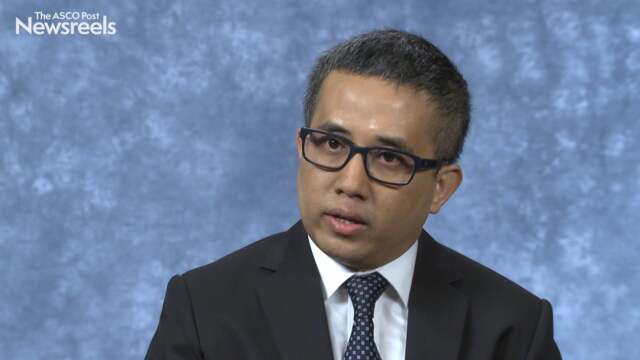2018 ASCO: Adjuvant mFOLFIRINOX vs Gemcitabine in Resected Pancreatic Cancer
In a randomized phase III trial, patients with surgically removed pancreatic cancer who received mFOLFIRINOX (a modified regimen containing oxaliplatin, leucovorin, irinotecan, and fluorouracil) lived a median of 20 months longer and were cancer-free 9 months longer than those who received the...
PARP Inhibitor Shows Promise in Patients With BRCA-Mutated Pancreatic Cancer
A targeted therapy that has been effective in fighting ovarian cancer in women, including those with BRCA1 and BRCA2 mutations, may also help patients with aggressive pancreatic cancer who harbor these mutations and have few or no other treatment options. An international team of researchers was...
Early Research May Unlock How Pancreatic Cancer Metastasizes to the Liver
Douglas Fearon, MD, Professor at Cold Spring Harbor Laboratory, and colleagues may have discovered how pancreatic cancer metastasizes to the liver following surgery, as reported by Pommier et al in Science. “This discovery is significant because for patients who undergo pancreatic cancer...
Neoadjuvant Therapy, Changes in Body Composition, and Resectability in Pancreatic Cancer
In a retrospective cohort study reported in JAMA Surgery, Sandini et al found that neoadjuvant therapy in patients with pancreatic ductal adenocarcinoma was associated with loss of adipose tissue but not muscle wasting. In addition, the study showed that an increase in skeletal muscle tissue was...
AACR 2018: Short-Acting Calcium Channel Blockers Associated With Increased Risk of Pancreatic Cancer in Postmenopausal Women
Calcium channel blockers (CCBs)—specifically the short-acting form of CCBs, which are prescribed to treat high blood pressure—were associated with an increased risk of pancreatic cancer in postmenopausal women, according to a study presented at the American Assocation for Cancer...
Emerging Thoughts About the Immune Landscape in Pancreatic Cancer
LONG-TERM SURVIVORS of pancreatic cancer display evidence of enhanced tumor-specific T-cell responses that are associated with unique neoepitope quality but not quantity, according to Steven D. Leach, MD, Director of the Norris Cotton Cancer Center and the Preston T. and Virginia R. Kelsey...
First Interim Analysis of Phase III SEQUOIA Trial in Pancreatic Cancer
ARMO BioSciences, Inc, recently announced the completion of the first interim analysis in its phase III SEQUOIA trial in patients with pancreatic cancer. The Data Monitoring Committee (DMC) for SEQUOIA, a clinical trial studying pegilodecakin (AM0010) plus FOLFOX (leucovorin,...
Gut Bacteria May Determine Speed of Tumor Growth in Pancreatic Cancer
The population of bacteria in the pancreas increases more than a thousandfold in patients with pancreatic cancer and becomes dominated by species that prevent the immune system from attacking tumor cells. These are the findings of an early study conducted on pancreatic ductal adenocarcinoma,...
FDA Grants Orphan Drug Designation to YS-ON-001 for the Treatment of Pancreatic Cancer
On February 26, Yisheng Biopharma Co., Ltd. announced that the U.S. Food and Drug Administration (FDA) has granted Orphan Drug designation to its lead immuno-oncology candidate, YS-ON-001, for the treatment of pancreatic cancer. YS-ON-001 is a clinical-stage immuno-oncology biologic product with...
Small Study Evaluates Novel Immunotherapeutic in Metastatic Pancreatic Cancer
IN PATIENTS WITH metastatic pancreatic adenocarcinoma, 1-year survival reached 43% following treatment with a novel immunotherapy—PEGylated human IL-10 (AM0010, pegilodecakin)—plus chemotherapy, in a small study reported at the 2018 Gastrointestinal Cancers Symposium.1 “We saw a very high disease...
FDA Grants Fast Track Designation to Pamrevlumab in Locally Advanced Unresectable Pancreatic Cancer
On March 1, the U.S. Food and Drug Administration (FDA) granted Fast Track designation for the anti–connective tissue growth factor (CTGF) antibody pamrevlumab for the treatment of patients with locally advanced unresectable pancreatic cancer. This follows review of the phase II clinical...
FDA Grants Orphan Drug Designation to YS-ON-001 for the Treatment of Pancreatic Cancer
On February 26, Yisheng Biopharma Co., Ltd. announced that the U.S. Food and Drug Administration (FDA) has granted Orphan Drug designation to its lead immuno-oncology candidate, YS-ON-001, for the treatment of pancreatic cancer. YS-ON-001 is a clinical-stage immuno-oncology biologic product...
Five Novel Genetic Changes Linked to Pancreatic Cancer Risk
In what is believed to be the largest pancreatic cancer genome-wide association study to date, researchers at the Johns Hopkins Kimmel Cancer Center, the National Cancer Institute, and collaborators from over 80 other institutions worldwide discovered changes to 5 new regions in the human genome...
LAPACT Trial Confirms Efficacy of Nab-Paclitaxel Plus Gemcitabine as Induction Therapy in Pancreatic Cancer
Patients newly diagnosed with locally advanced pancreatic cancer who received induction therapy with nanoparticle albumin-bound (nab)-paclitaxel (Abraxane) and gemcitabine achieved a time to treatment failure and median progression-free survival that exceeded the protocol-specified target by more...
FDA Approves Lutetium Lu-177 Dotatate for Treatment of Gastroenteropancreatic Neuroendocrine Tumors
On January 26, the U.S. Food and Drug Administration (FDA) approved lutetium Lu-177 dotatate (Lutathera) for the treatment of gastroenteropancreatic neuroendocrine tumors (GEP-NETs). This is the first time a radiopharmaceutical has been approved for the treatment of GEP-NETs. Lu-177 dotatate is...
Detecting and Localizing Eight Cancer Types With One Multianalyte Blood Test
Johns Hopkins Kimmel Cancer Center researchers developed a single blood test that screens for eight common cancer types and also helps identify the location of the cancer. The test, called CancerSEEK, is a unique noninvasive, multianalyte test that simultaneously evaluates levels of eight cancer...
2018 GI CANCERS SYMPOSIUM: Nab-Paclitaxel Plus Gemcitabine in Locally Advanced Pancreatic Cancer
Primary endpoint findings and updated results of secondary endpoints from the phase II LAPACT trial of nanoparticle albumin–bound (nab)-paclitaxel (Abraxane) plus gemcitabine in patients with locally advanced pancreatic cancer were presented by Hammel et al at the 2018 Gastrointestinal (GI)...
Ramesh K. Ramanathan, MD, on Metastatic Pancreatic Cancer: Results From a SWOG Study
Ramesh K. Ramanathan, MD, of the Mayo Clinic, discusses early-phase study findings on mFOLFIRINOX (mFFOX) plus pegylated recombinant human hyaluronidase vs mFFOX alone in patients with a good performance status (Abstract 208).
Steven D. Leach, MD, on Pancreatic Cancer: Keynote Lecture
Steven D. Leach, MD, of Dartmouth University’s Norris Cotton Cancer Center, discusses the personalized approach that GI cancers will require to make rational use of immunotherapy—including a subset of pancreatic cancers, which appear to be highly immunogenic and are associated with long-term survival.
Kyaw L. Aung, MBBS, PhD, on Pancreatic Cancer: Results From the COMPASS Trial
Kyaw L. Aung, MBBS, PhD, of Princess Margaret Cancer Centre, discusses early study findings on genomics-driven precision medicine for advanced pancreatic ductal carcinoma (Abstract 211).
Addition of PEGPH20 to Nab-Paclitaxel/Gemcitabine in Pancreatic Ductal Adenocarcinoma
In a phase II study reported in the Journal of Clinical Oncology, Hingorani et al found that the addition of pegvorhyaluronidase alfa (PEGPH20) to nab-paclitaxel (Abraxane)/gemcitabine improved progression-free survival in patients with previously untreated metastatic pancreatic ductal...
Identification of Cystic Precursors to Pancreatic Cancer Using Targeted Mass Spectrometry
In a study reported in the Journal of Clinical Oncology, Jabbar et al found that mass spectroscopy proteomic analysis of the pancreatic cyst fluid biomarkers mucin-5AC (MUC5AC), mucin-2 (MUC2), and prostate stem cell antigen (PSCA) identified cystic pancreatic cancers and precursor lesions with...
Achieving One’s Childhood Dreams While Facing Pancreatic Cancer
BOOMARK Title: The Last LectureAuthor: Randy Pausch with Jeffrey ZaslowPublisher: HyperionDate: April 2008Price: $21.95, hardcover; 206 pages Faced with imminent death, how does one chose to live out the remainder of one’s life? Such is the question at the heart of The Last Lecture, a memoir...
Resectable Pancreatic Cancer: Neoadjuvant or Adjuvant Therapy?
For potentially curable treatment of resectable pancreatic cancer, adjuvant therapy remains the standard “for now,” but evidence is growing that neoadjuvant therapy may be more beneficial, at least in certain patient subsets, according to Thomas Seufferlein, MD, PhD, Professor of Medicine at the...
David A. Tuveson, MD, PhD, on Progress in Pancreatic Cancer: Expert Perspective
David A. Tuveson, MD, PhD, of Cold Spring Harbor Laboratory, discusses the most lethal of cancers. Although treatments are improving, the challenges are great, including early detection of this malignancy, which metastasizes early in its development.
Adding Adjuvant Erlotinib to Gemcitabine After R0 Resection of Pancreatic Cancer
The German phase III CONKO-005 trial has shown no significant benefit of adding adjuvant erlotinib (Tarceva) to gemcitabine after R0 resection in patients with pancreatic ductal adenocarcinoma. The findings were reported in the Journal of Clinical Oncology by Sinn et al. Study Details In the...
Germline Mutations in Apparent Sporadic Pancreatic Adenocarcinoma
As reported by Shindo et al in the Journal of Clinical Oncology, deleterious germline mutations in known pancreatic cancer susceptibility genes were frequently found in patients with pancreatic cancer who do not have a reported family history of cancer. Study Details The study involved sequencing ...
NCCN Panelists Relay ‘What’s Hot’ in Their Fields
AT THE NATIONAL Comprehensive Cancer Network® (NCCN®) 22nd Annual Conference, experts from several fields met with journalists to highlight “what’s hot” in their specialties. The ASCO Post captured that conversation. Myeloproliferative Neoplasms Guidelines NCCN HAS LAUNCHED new NCCN Clinical...
Stereotactic Body Radiotherapy for Poor Performance Status Patients With Pancreatic Cancer
There are few data to guide the management of nonmetastatic pancreatic ductal adenocarcinoma in patients who are elderly or have a poor performance status. Although most such patients are offered supportive care or gemcitabine alone, the addition of stereotactic body radiotherapy may improve...
Has a New Standard Really Been Established for the Adjuvant Treatment of Pancreatic Cancer?
THE PAST YEAR has undoubtedly been a disappointing one as far as clinical advances in pancreatic cancer go. No fewer than five high-profile randomized phase II or III trials in this setting reported negative results in 2016, ranging from next-generation cytotoxic agents1 to novel immunotherapeutic ...
Addition of Adjuvant Capecitabine to Gemcitabine Improves Survival in Patients With Resected Pancreatic Cancer
IN THE EUROPEAN phase III ESPAC-4 trial reported in The Lancet, John P. Neoptolemos, MD, of the Liverpool Clinical and Cancer Research UK Trials Unit, University of Liverpool, and colleagues found that adding adjuvant capecitabine to gemcitabine significantly improved overall survival in patients...
WCHN Launches Trial to Screen Newly Diagnosed Patients With Diabetes for Early-Stage Pancreatic Cancer
Western Connecticut Health Network (WCHN) has announced the launch of a 3-year research study that will investigate the link between new-onset diabetes and pancreatic cancer. The main goal of the study is to detect the often lethal cancer at a curable stage. The study was developed by a team of...
ESMO World GI 2017: Pegilodecakin Plus FOLFOX in Advanced Pancreatic Cancer
Clinical data on an investigational immuno-oncology drug pegilodecakin (PEGylated human interleukin-10, also known as AM0010) was presented by Hecht et al at the ESMO 19th World Congress on Gastrointestinal Cancer in Barcelona, Spain (Abstract O-004). Pegilodecakin is being evaluated in an ongoing...
WCHN Launches Trial to Screen Newly Diagnosed Patients With Diabetes for Early-Stage Pancreatic Cancer
Western Connecticut Health Network (WCHN) has announced the launch of a 3-year research study that will investigate the link between new-onset diabetes and pancreatic cancer. The main goal is to detect the often lethal cancer at a curable stage. The study was developed by a team of physicians and...
Adding Vandetanib to Gemcitabine in Locally Advanced or Metastatic Pancreatic Carcinoma
In a UK phase II trial reported in The Lancet Oncology, Middleton et al found that adding the multi–tyrosine kinase inhibitor vandetanib (Caprelsa) to gemcitabine did not improve overall survival in patients with previously untreated locally advanced or metastatic pancreatic carcinoma. John P....
SNMMI 2017: Immuno-PET Shows Promise for Detecting and Treating Pancreatic Tumors, Other Solid Tumors
A first-in-human study presented at the 2017 Annual Meeting of the Society of Nuclear Medicine and Molecular Imaging (SNMMI) (Abstract 385) demonstrated the feasibility and safety of imaging with the novel human monoclonal antibody HuMab-5B1, to enable highly specific targeting for the cancer...
ASCO 2017: Adding PEGPH20 to Standard Treatment in Metastatic Pancreatic Cancer May Delay Disease Progression
By adding an experimental drug to a standard chemotherapy regimen, a subset of patients with metastatic pancreatic cancer had a significantly longer period before the cancer progressed as compared with those who received the standard treatment, according to a phase II clinical trial led by an...
ESTRO 2017: Study Suggests Role for Radiotherapy in Extending Survival in Patients With Early-Stage Pancreatic Cancer
Radiotherapy at a high enough dose may increase survival in early-stage pancreatic cancer, according to research presented at the European Society for Radiotherapy & Oncology (ESTRO) 36 Conference.1 Previous research has suggested that radiotherapy may be of little help in this setting. The...
Hydroxychloroquine Boosts Antitumor Activity of Neoadjuvant Chemotherapy for Pancreatic Cancer
Adding hydroxychloroquine, an inhibitor of autophagy, to neoadjuvant chemotherapy for pancreatic cancer increases its efficacy and alters the tumor’s molecular profile in a way that may render the tumor more susceptible to immune checkpoint inhibitors, according to interim data from a phase II...
ESTRO 2017: Study Suggests Role for Radiotherapy in Extending Survival in Patients With Early-Stage Pancreatic Cancer
Radiotherapy at a high enough dose may increase survival in early-stage pancreatic cancer, according to research presented at the European Society for Radiotherapy & Oncology (ESTRO) 36 Conference (Abstract OC-0426). Previous research has suggested that radiotherapy may be of little help to...
Update to ASCO Clinical Practice Guideline on Potentially Curable Pancreatic Cancer
An ASCO clinical practice guideline update, reported by Khorana et al in the Journal of Clinical Oncology, includes the recommendation of gemcitabine-capecitabine doublet therapy as an adjuvant therapy option in potentially curable pancreatic cancer. The updated recommendation (4.1) modifies the...
Onset of Diabetes or Its Rapid Deterioration Can Be an Early Warning Sign of Pancreatic Cancer
The onset of diabetes, or a rapid deterioration in existing diabetes that requires more aggressive treatment, could be a sign of early, hidden pancreatic cancer, according to research presented by Autier et al at the 2017 European Cancer Congress (Abstract 540).1 Study Design and Key Findings...
Cigarette Smoking and Survival in Pancreatic Cancer
A study of data from large prospective U.S. cohorts has shown that current cigarette smoking, greater pack-years, and heavy smoking were associated with poorer survival among patients with pancreatic cancer. The study was reported by Yuan et al in the Journal of Clinical Oncology. Study Details...
AACR 2017: PRMT1 Identified as Potential Druggable Target for Pancreatic Cancer
A protein known as arginine methyltransferase 1 (PRMT1) may be a potential therapeutic target for pancreatic ductal adenocarcinoma, according to results presented by Giuliani et al the 2017 Annual Meeting of the American Association for Cancer Research (AACR) in Washington, DC (Abstract 3016)....
Margaret A. Tempero, MD, on Pancreatic Cancer: Active Systemic Treatment
Margaret A. Tempero, MD, of the UCSF Helen Diller Family Comprehensive Cancer Center, discusses the evidence for using neoadjuvant and adjuvant systemic therapies in resectable and borderline resectable pancreatic cancer.
SSO 2017: Preclinical Trial Shows Intratumoral Vaccination Induces Antitumor Response in Pancreatic Cancer
Building on their previous research focusing on intratumoral vaccination for the most common form of pancreatic cancer, investigators from Rutgers Cancer Institute of New Jersey and Rutgers Robert Wood Johnson Medical School have shown that in a mouse model of early-stage resected pancreatic...
Adding Vandetanib to Gemcitabine in Locally Advanced or Metastatic Pancreatic Carcinoma
In a UK phase II trial reported in The Lancet Oncology, Middleton et al found that adding the multi–tyrosine kinase inhibitor vandetanib (Caprelsa) to gemcitabine did not improve overall survival in patients with previously untreated locally advanced or metastatic pancreatic carcinoma. Study ...
Expert Point of View: Allyson J. Ocean, MD
Allyson J. Ocean, MD, a pancreatic cancer specialist at New York-Presbyterian Hospital/Weill Cornell Medical Center and Associate Professor of Medicine at the Weill Medical College of Cornell University, commented on these study findings. “While I applaud the authors for the data presented, the...
Update on Overall Survival for Newly Diagnosed Patients With Metastatic Pancreatic Cancer
Although “treatment advances” and “precision medicine” are today’s buzz words in oncology, they don’t apply equally to all malignancies. For instance, median overall survival for newly diagnosed patients with metastatic pancreatic cancer has not improved much over the past 20 years, according to...
Two Migration Proteins Boost Predictive Value of Pancreatic Cancer Biomarker
Adding two blood-borne proteins associated with cancer cell migration increases the predictive ability of the current biomarker for pancreatic cancer to detect early-stage disease, a research team from The University of Texas MD Anderson Cancer Center reported in a study by Balasenthil et al in the ...





